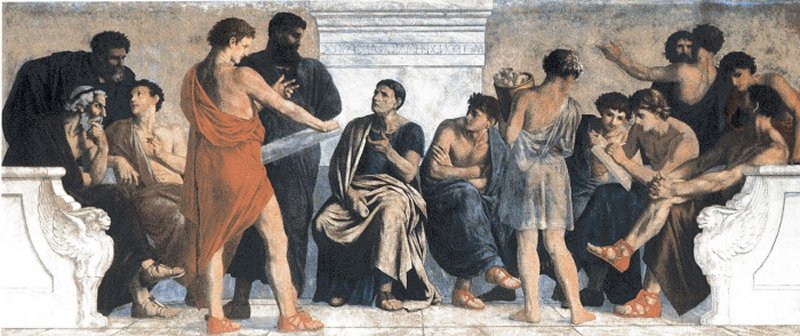Aristotle: First Book Collector Who Assembled The First Great Library Of Antiquity
A. Sutherland - AncientPages.com - Aristotle of Stagira (c. 384 BC - 322 BC) founded his own school, called High School, in the year 335 BC.
It was located just outside Athens in the vicinity of a beautiful grove dedicated to the god Apollo Lyceus. This prominent school, certainly comparable to our modern universities, became known as the Lyceum, an education and research center.
"That most enduring of romantic images, Aristotle tutoring the future conqueror Alexander". Illustration by Charles Laplante, 1866. Public Domain
It was also known as a 'Peripatetic School' (Greek word peripatos, means stroll) as it is believed that Aristotle liked to walk with his student along the school’s walkways, discussing philosophy and the principles of mathematics.
Aristotle’s great school also played a crucial role as a library and museum. Supported by a large monetary gift of 800 talents from Alexander the Great, Aristotle organized his impressive collection of plant and animal specimens and collected diverse manuscripts and maps of great value.
Aristotle also encouraged the school’s teachers to gather information regarding medicine, mathematics, physics, botany, philosophy, astronomy, rhetoric ethics, theology, cosmology, and other areas of science. Members of his Lyceum were busy conducting research on a wide range of subjects.
This great thinker has prepared enormous material as a basis for lectures. Aristotle is considered the first book collector to assemble the first great library of antiquity.
Later, passed into the hands of the philosopher Neleus of Skepsis, and the library lost its connection with the School. The books did not return to its original place but were scattered. His intellectual legacy is enormous and contains scientific lectures and literary and scientific works, as evidenced by 143 works in 400 books, not counting letters and poetry.
Before his death in 322 BC, Aristotle handed over a library along with his own manuscript legacy to his Theophrastus of Eresos (c. 371–287 BC), who was his successor, Aristotle’s close colleague, philosopher and successor at the Lyceum, who wrote many treatises, in all areas of philosophy, in order to support, improve, expand, and develop the Aristotelian system.
The School of Aristotle. Fresco by Gustav-Adolph Spangenberg, circa 1883-1888. Gustav Adolph Spangenberg — source - Public Domain
Until the death of Theophrastus in 287 BC, Aristotle's famous lectures were the basis of teaching in the school.
As Edith Hall, a British scholar of classics, wrote, “the papyrus on which most ancient Greek and Latin books were recorded, as an organic material, was extremely vulnerable to rotting and wear and tear”…and “two generations later the collection of rolls ended up in the hands of some “ordinary people” of Scepsis in Asia Minor, who did not know how to store its precious contents…”
According to one version, Neleus od Scepsis, a pupil of Theophrastus, kept the original manuscripts of both philosophers but sold other books from the library to Ptolemy II, the ruler of Egypt who was at that time occupied with the creation of his own great library at Alexandria.
Later the library of the Stagira got into the hands of people who kept books in very bad conditions because Neleus’ descendants, who inherited the priceless works had no idea how to store them. They only wanted to protect the writings from being stolen. Kept for a very long time in the dark basement, the manuscripts were damaged.
Aristotle’s work was not in the form of ordinary books but only notes and manuscripts, and yet, his surviving writings were incredibly influential.
More than 2300 years after his death, Aristotle remains one of the most influential people ever. He contributed to almost every field of human knowledge then in existence, and he was the founder of many new fields of science.
Updated on January 29, 2023
Written by – A. Sutherland - AncientPages.com Senior Staff Writer
Copyright © AncientPages.com All rights reserved. This material may not be published, broadcast, rewritten or redistributed in whole or part without the express written permission of AncientPages.com
Expand for referencesReferences:
Lancour H. Daily Jay E. Encyclopedia of Library and Information Science: Volume 24
Baker R.F. Baker III, C. F. Ancient Greeks: Creating the Classical Tradition
Stanford Encyclopedia of Philosophy
More From Ancient Pages
-
 Oldest Indo-European Calendar Based On The Orion Constellation Is Engraved On A Vucedol Vessel
Artifacts | Jun 7, 2021
Oldest Indo-European Calendar Based On The Orion Constellation Is Engraved On A Vucedol Vessel
Artifacts | Jun 7, 2021 -
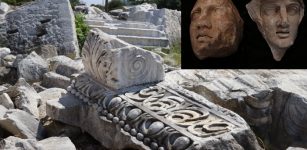 Once Impressive Temple Of Hadrian In City Of Cyzicus Will Be Restored Soon
Archaeology | Sep 7, 2020
Once Impressive Temple Of Hadrian In City Of Cyzicus Will Be Restored Soon
Archaeology | Sep 7, 2020 -
 Jason And The Argonauts – Hate, Sorcery, Love And Jealousy Reign In This Famous Greek Story
Featured Stories | Jan 6, 2022
Jason And The Argonauts – Hate, Sorcery, Love And Jealousy Reign In This Famous Greek Story
Featured Stories | Jan 6, 2022 -
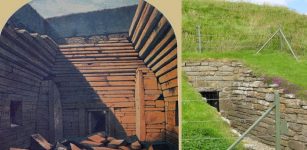 Upside Down Chambers For The Dead Found At Maeshowe, Orkney
Archaeology | Sep 8, 2020
Upside Down Chambers For The Dead Found At Maeshowe, Orkney
Archaeology | Sep 8, 2020 -
 Ancient Secrets Of The Masters Of Mu – Myths And Legends Examined – Part 1
Ancient Mysteries | Aug 24, 2018
Ancient Secrets Of The Masters Of Mu – Myths And Legends Examined – Part 1
Ancient Mysteries | Aug 24, 2018 -
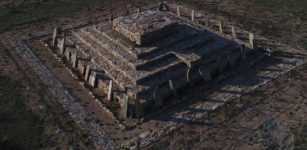 Intriguing 3,400-Year-Old Multipurpose Pyramid Found In Kazakhstan
Archaeology | Nov 2, 2023
Intriguing 3,400-Year-Old Multipurpose Pyramid Found In Kazakhstan
Archaeology | Nov 2, 2023 -
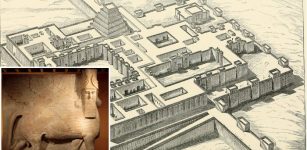 Magnetic Survey Finds Huge Previously Unknown Ancient Buildings In Abandoned Assyrian Capital Khorsabad
Archaeology | Dec 20, 2024
Magnetic Survey Finds Huge Previously Unknown Ancient Buildings In Abandoned Assyrian Capital Khorsabad
Archaeology | Dec 20, 2024 -
 Secrets Of The Assyrian Dream Book And Dream Interpretation In The Ancient Near East
Featured Stories | Aug 6, 2021
Secrets Of The Assyrian Dream Book And Dream Interpretation In The Ancient Near East
Featured Stories | Aug 6, 2021 -
 Evil Spirits And Demons Of Marshes And Swamps In Slavic Folklore
Featured Stories | Nov 16, 2016
Evil Spirits And Demons Of Marshes And Swamps In Slavic Folklore
Featured Stories | Nov 16, 2016 -
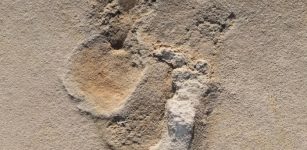 Oldest Footprints Of Pre-Humans Discovered In Crete – They Are 6 Million-Year-Old!
Archaeology | Oct 12, 2021
Oldest Footprints Of Pre-Humans Discovered In Crete – They Are 6 Million-Year-Old!
Archaeology | Oct 12, 2021 -
 Brown Hares And Chickens Were Seen As Gods Not Food In Iron Age Britain
Archaeology | Apr 12, 2020
Brown Hares And Chickens Were Seen As Gods Not Food In Iron Age Britain
Archaeology | Apr 12, 2020 -
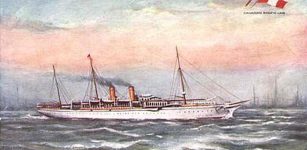 On This Day In History: First US Ship To Trade With China, ‘Empress Of China’ Sails From NY – On Feb 22, 1784
News | Feb 22, 2017
On This Day In History: First US Ship To Trade With China, ‘Empress Of China’ Sails From NY – On Feb 22, 1784
News | Feb 22, 2017 -
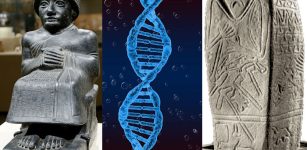 Ancient DNA Provides Comprehensive Genomic History Of The “Cradle Of Civilization”
Archaeology | Oct 10, 2022
Ancient DNA Provides Comprehensive Genomic History Of The “Cradle Of Civilization”
Archaeology | Oct 10, 2022 -
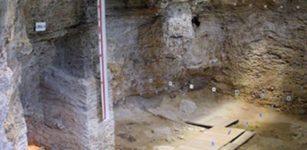 Abric Romaní Cave: New evidence indicates Neanderthals used to heat water some 60,000 years ago
Human Beginnings | Aug 31, 2015
Abric Romaní Cave: New evidence indicates Neanderthals used to heat water some 60,000 years ago
Human Beginnings | Aug 31, 2015 -
 Leprechaun: One Of The Most Famous And Powerful Creatures Of The Irish Faerie Folk
Celtic Mythology | May 8, 2016
Leprechaun: One Of The Most Famous And Powerful Creatures Of The Irish Faerie Folk
Celtic Mythology | May 8, 2016 -
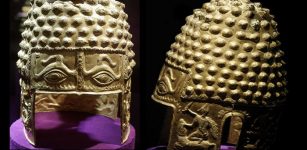 Ancient Dacian Gold Helmet With Piercing Evil Eyes
Artifacts | Jan 4, 2019
Ancient Dacian Gold Helmet With Piercing Evil Eyes
Artifacts | Jan 4, 2019 -
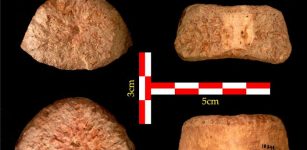 1.5 Million-Year-Old Human Vertebra Discovered In Israel’s Jordan Valley Sheds New Light On Migration From Africa To Eurasia
Archaeology | Feb 3, 2022
1.5 Million-Year-Old Human Vertebra Discovered In Israel’s Jordan Valley Sheds New Light On Migration From Africa To Eurasia
Archaeology | Feb 3, 2022 -
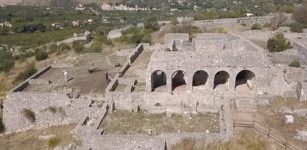 Was Beautiful Ancient City Of Terracina Home To The First Hellenistic Temple?
Archaeology | Dec 16, 2019
Was Beautiful Ancient City Of Terracina Home To The First Hellenistic Temple?
Archaeology | Dec 16, 2019 -
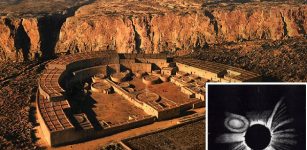 Chaco Canyon’s Piedra del Sol Petroglyph Depicts An Ancient Total Eclipse Visible In The Year 1097
Archaeology | Aug 12, 2017
Chaco Canyon’s Piedra del Sol Petroglyph Depicts An Ancient Total Eclipse Visible In The Year 1097
Archaeology | Aug 12, 2017 -
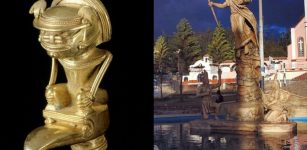 Legend Of Bochica And Mysterious Ancient Stone Structures In Colombia
Featured Stories | Jun 5, 2016
Legend Of Bochica And Mysterious Ancient Stone Structures In Colombia
Featured Stories | Jun 5, 2016

!["That most enduring of romantic images, Aristotle tutoring the future conqueror Alexander".[147] Illustration by Charles Laplante [fr], 1866](https://www.ancientpages.com/wp-content/uploads/2017/06/aristotlealexander1.jpg)
